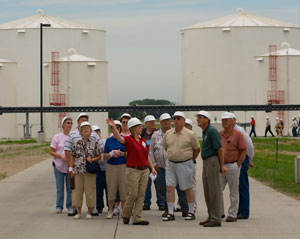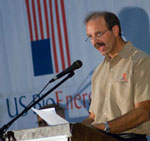 POET held a groundbreaking ceremony Thursday for their third ethanol production facility in the Ohio. The site is located northeast of Fostoria.
POET held a groundbreaking ceremony Thursday for their third ethanol production facility in the Ohio. The site is located northeast of Fostoria.
POET Biorefining – Fostoria is planned as a 60 million gallon per year facility which will consume 21 million bushels of locally grown corn.
Mike Wagner, Executive Director of the Buckeye Renewable Fuels Association, said “We’ve been working for years to bring ethanol production to the Buckeye state because it’s going to be tremendous for our rural economy. With POET, we’re proud to have one of the leading ethanol producers in the U.S. breaking ground for its third plant in the state of Ohio. Fostoria has been an agricultural center for years and this ethanol plant will ensure that tradition continues for many years to come.”
POET is building a 60 million gallon per year facility near Leipsic which is expected to be completed early next year and ground was broken on a site near Marion in July.



 “The reality for communities from coast to coast to benefit from ethanol is here,” Gov. Heineman said. “Ethanol production is one of the major drivers of economic activity in small communities across our state, and I’m very pleased to have the opportunity to see this plant up and running.”
“The reality for communities from coast to coast to benefit from ethanol is here,” Gov. Heineman said. “Ethanol production is one of the major drivers of economic activity in small communities across our state, and I’m very pleased to have the opportunity to see this plant up and running.”  “As we celebrate the grand opening of US Bio Ord, I am pleased to reflect on the success of our company’s growth,” commented Gordon Ommen, CEO of US BioEnergy. “We are thrilled to be a member of the Ord community with a shared vision of energy independence and economic vitality.”
“As we celebrate the grand opening of US Bio Ord, I am pleased to reflect on the success of our company’s growth,” commented Gordon Ommen, CEO of US BioEnergy. “We are thrilled to be a member of the Ord community with a shared vision of energy independence and economic vitality.”
 A hydrogen-powered Ford Fusion has taken part in the annual Speed Week at the famous Bonneville Salt Flats this week and hit an amazing 161 MPH!
A hydrogen-powered Ford Fusion has taken part in the annual Speed Week at the famous Bonneville Salt Flats this week and hit an amazing 161 MPH! A new tradition at the 150-year-old Indiana State Fair has started this year as biodiesel powers the fair’s midway.
A new tradition at the 150-year-old Indiana State Fair has started this year as biodiesel powers the fair’s midway. The Research Institute of Innovative Technology for the Earth is aiming for commercial production in three years. RITE was established in 1990 by the government and leading Japanese firms in such industries as automobiles and power.
The Research Institute of Innovative Technology for the Earth is aiming for commercial production in three years. RITE was established in 1990 by the government and leading Japanese firms in such industries as automobiles and power. Fairgoers have the opportunity to reminisce about the customer service of old-time filling stations at the 2007 Missouri State Fair. Tad Whitten, owner of Motorsports Management, is displaying his replica of a 1933 Ethanol filling station at the fair. But, the exhibit is more than just a display. The old-fashioned filling station features skits throughout the day that are meant to help educate fairgoers on the history of ethanol. Tad says most people are surprised to find out that ethanol has been around as a fuel source for more than 100 years. You can listen to my conversation with Tad here:
Fairgoers have the opportunity to reminisce about the customer service of old-time filling stations at the 2007 Missouri State Fair. Tad Whitten, owner of Motorsports Management, is displaying his replica of a 1933 Ethanol filling station at the fair. But, the exhibit is more than just a display. The old-fashioned filling station features skits throughout the day that are meant to help educate fairgoers on the history of ethanol. Tad says most people are surprised to find out that ethanol has been around as a fuel source for more than 100 years. You can listen to my conversation with Tad here: European mega-financier, Fortis, has inked a deal to buy 1.1 million megawatt hours of power for the next 10 years from Enel North America. The estimated $80-million deal is seen as a hedge against the price of electricity from natural gas.
European mega-financier, Fortis, has inked a deal to buy 1.1 million megawatt hours of power for the next 10 years from Enel North America. The estimated $80-million deal is seen as a hedge against the price of electricity from natural gas. A biodiesel plant that will add 30 percent to the U.S. biodiesel production capacity when it opens will start doing just that when the Imperium Renewables plant at Gray’s Harbor in Washington state starts production on Wednesday.
A biodiesel plant that will add 30 percent to the U.S. biodiesel production capacity when it opens will start doing just that when the Imperium Renewables plant at Gray’s Harbor in Washington state starts production on Wednesday.